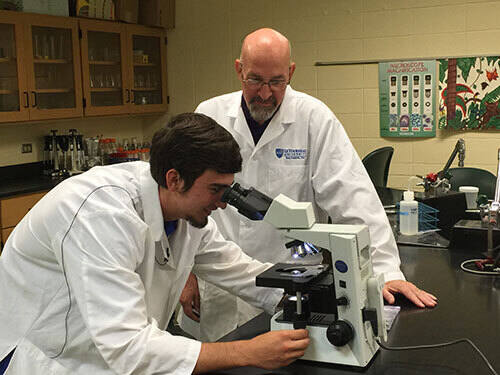 Armed with plastic spoons and sandwich baggies, the biology students in Dr. Greg Frederick's freshman biology class fanned out across the LETU campus to dig in the dirt in search of bugs, but not the insect kind.
Armed with plastic spoons and sandwich baggies, the biology students in Dr. Greg Frederick's freshman biology class fanned out across the LETU campus to dig in the dirt in search of bugs, but not the insect kind.
They were looking for microscopic viruses called "bacteriophages" as part of the Phage Hunters Advancing Genomics and Evolutionary Sciences (PHAGES) program, an undergraduate research project in partnership with the Howard Hughes Medical Institute's Science Education Alliance.
LETU biology professor Dr. Greg Frederick well understands the importance of getting undergraduate students involved in meaningful, hands-on research. He remembers when he got the first taste of doing hands-on research as a college student, and it hooked him.
That is why Frederick invested the time and energy to apply to have LETU selected as one of the universities worldwide, and one of only a handful in Texas, partnering with the PHAGES program. He wants his students to get hooked on doing research on which to build their future careers.
Phages are important because they are viruses that attack bacteria, and as bacteria mutate, the phages can also mutate and kill the bacteria.
"Certain strains of tuberculosis are particularly antibiotic resistant and mutate quickly," Frederick said. "Using these viruses as alternative treatment could potentially solve problems of tuberculosis and other antibiotic-resistant diseases."
Howard Hughes Medical Institute launched the Science Education Alliance to support scientists and educators to advance biomedical research and train the next generation through education, discovery and leadership.
"This Science Education Alliance enables our students to do meaningful research as they isolate previously unidentified viruses from the environment around them, characterize those viruses, sequence and annotate their genomes, and then have opportunity present their results at academic conferences and to publish in scientific journals," Frederick said.
One of Frederick's first students to discover a new virus through the PHAGES program was Brian "Blake" Maxfeldt of Katy, Texas. Maxfeldt hopes to become an orthodontist.
Maxfeldt tested a soil sample from a flower bed just outside the Solheim Athletic and Recreational Center on the LETU campus and isolated the phage that was determined to be a new discovery.
Grateful for the opportunity to do hands-on research as an undergraduate, Maxfeldt chose to name the novel virus the "Solheim Virus," in honor of the long-time LETU Board of Trustees member John Solheim and his family, for whom the Solheim Center is named.
"I've learned so many skills through the process that I feel will put me at a greater advantage when I apply for graduate school," Maxfeldt said.
Funding is being sought to conduct genomic sequencing and further molecular and bioinformatics characterization of the Solheim virus and the 20 other viruses isolated by LETU students which have yet to be fully characterized. More detailed information about the Solheim virus can be found online at http://phagesdb.org/phages/Solheim.